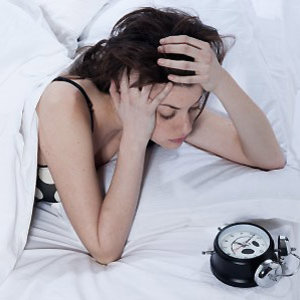Is your age the reason you can't sleep?
We all know that stress and caffeine can leave you tossing and turning at night, but your age could also be your secret sleep saboteur

The sound of a car outside can do it. Or a duvet rustle as your partner rolls over. Sometimes it’s no noise at all. Whatever the cause, there you are, in the middle of the night, wide awake and struggling to get back to sleep. You might get up, go to the bathroom, switch on the light, read, toss and turn, write some emails or just lie there stewing in your own sleepless misery. Pull back the curtains of many bedrooms in Britain and you’ll find the same story. With an estimated one in three* of us suffering from insomnia or some sort of sleep disorder, a good night’s sleep is fast becoming a precious commodity – and one which experts say will become more difficult to achieve as we live longer.
‘The problem is that sleep is socially invisible,’ says Kevin Morgan, director of the Clinical Sleep Research Unit at Loughborough University. ‘We all know about other aspects of ageing – your hair will go grey, your skin will get wrinkly, your body shape will change – but no one talks about how it will affect your sleep.’
First, there’s the issue of quantity. ‘To function well, a baby might need up to 17 hours sleep, a 40-year-old needs approximately seven and a 70 year-old no more than six,’ says Kevin. So getting less sleep as you grow older is a sad, but inevitable reality.
The problem lies more in the quality. Recent studies by the University of Surrey have revealed that the amount of time spent in deep or non-REM sleep – the most satisfying, restorative sleep that usually occurs in the middle of the night – lessened with age. Women especially are vulnerable, with nearly 20 per cent claiming to have a bad night’s sleep five times a week, as opposed to just eight per cent of men. ‘During periods of light sleep you are likely to be woken up by a noise or even just your partner rolling over.,’ adds Kevin.
The menopause, which can strike any time from your mid forties, can mean all chance of a decent night’s sleep is virtually gone. ‘At this point, there’s a drop in oestrogen and progesterone and a general hormonal imbalance which can disrupt sleep, skew your internal temperature and make you more vulnerable to stress,’ says Matthew Walker, professor of Neurology at London’s National Hospital for Neurology and Neurosurgery.
Add to this hot flushes, which have you waking up in a hot sweat, pumped up with an accompanying surge of adrenalin, and broken nights are par for the course. And while experts say that women are more used to disturbed sleep, thanks to their biological role as nurturers (having periods, babies, wakeful children and the like) and social role as care-givers (which means they worry more), our sleep deprivation is having an impact on all areas of our lives. The 2010 Great British Sleep Survey revealed four times as many insomnia sufferers reporting relationship difficulties and more than 80 per cent saying they regularly experienced low moods. ‘Sleep has an effect on the chemicals in the brain which are necessary for laying down memories, building up proteins and essentially repairing your body,’ says Professor Walker. ‘If you’re deprived of sleep, it’s much harder to cope with everything around you.’
Yoga and meditation expert Alison Francis (www.anandi.co.uk) blames the growth in sleep problems on today’s fast-paced society and the pressures we face. ‘Women often think they have to do it all perfectly with work, children and relationships. Something has to give, and that something can often be sleep,’ Alison says.
When women come to her feeling stressed out and exhausted, she recommends an ancient yoga practice called Nidra. ‘It is a conscious physiological and psychological relaxation of the whole system which takes half an hour and is worth four hours’ sleep at least,’ she says. The practice involves sitting on a floor or yoga mat somewhere quiet, bringing your focus inwards and systematically going round each part of your body from head to toe, breathing in and out of your nose, and relaxing it.’
She also stresses the importance of a healthy, balanced diet, and one which incorporates lots more of the essential amino acid, tryptophan, found in foods such as turkey, milk, bananas, avocados and pasta. ‘This helps to produce serotonin, the neurotransmitter which helps to regulate appetite, sleep patterns and mood, and produces the all-important sleep-inducing chemical, melatonin.’
Cognitive behavioural therapy (CBT) is another tried-and-tested way to tackle deep-rooted stress or anxiety which may be keeping you awake. Before he begins with any client, Lee Grant, CBT consultant (020 7929 7911), focuses on ‘sleep hygiene’, which is effectively a list of lifestyle dos and don’ts. ‘The most important of the dos is to only go to sleep when drowsy and wake up at the same time each morning, including weekends,’ explains Lee. ‘This will give you a consistent sleep rhythm and synchronise your biological clock.’
Daytime naps, however tempting, should be avoided, adds Kevin. ‘If you’ve got a sleep problem, sleepiness should be seen as a resource, not something to be squandered during the day, but saved up for night time.’
Other rules are taking regular exercise (but not after 6pm as this will keep the adrenalin pumping), avoiding alcohol and stimulants such as nicotine and caffeine a few hours before bedtime and trying to make your sleeping environment cosy with minimum sound, light and noise and a comfortable temperature. Once good sleep hygiene is in place, CBT focuses on techniques to stem midnight panics about not having filled in your tax return. ‘We’ll teach you ways to relax and postpone your worry or schedule worry time so you don’t end up doing it all night,’ says Lee.
With courses short and sleep often improving after just six sessions, Kevin believes CBT offers a much better alternative to sleeping pills. ‘Tablets might work to treat acute insomnia in the short term but they don’t address the causes of sleeplessness the way therapy does or give you tools in which to change your sleeping habits,’ he says. Speak to your GP and you may qualify for a short course on the NHS or, if you go private, he should be able to give you a list of local recommended therapists. Sessions cost from £40 to £100 an hour.
As well as an being an ageing population, we are also becoming increasingly overweight, and size can also be an issue when it comes to sleep problems. There has been a 25 per cent increase in sleep disorder patients in Scotland, with 80 per cent of them overweight. In most of these cases, patients have obstructive sleep apnoea caused by their windpipe getting floppier with fat, leading to choking during her sleep in the night when muscle relaxation is most profound. ‘This can happen 20 or 30 times in the night but because you don’t fully wake up, you might not even know you have it,’ explains Morgan.
Signs that you do have sleep apnoea include loud, heavy snoring (if you don’t know, your partner will tell you!), daytime exhaustion due to lack of deep sleep and morning headaches. Treatments vary from the self-help kind, such as sleeping on tennis balls (which are uncomfortable if you lie on your back and will encourage you to turn on your side) to throat- strengthening exercises, to getting special apparatus from a sleep clinic that can help with your breathing.
You might also like...
Discover why you're feeling so tired
Ten ways to get a good night's sleep
Sleep well - our complete guide











